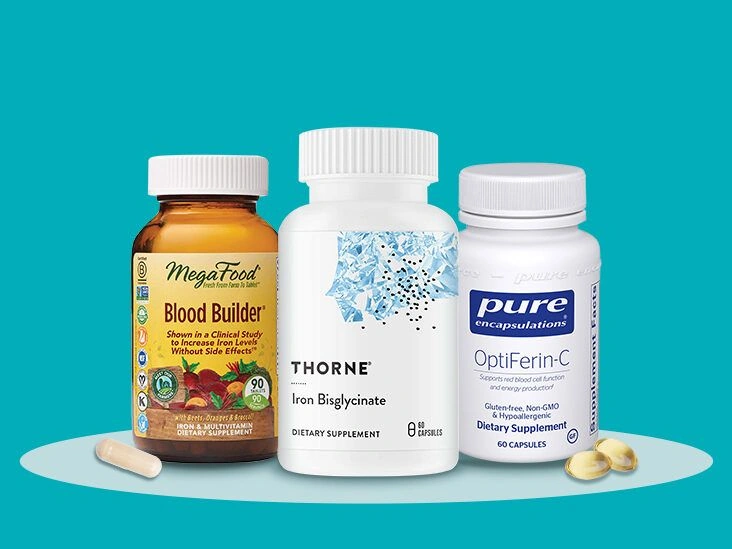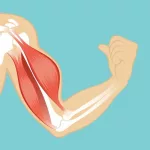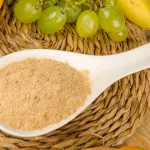If you need extra iron in your diet, finding the best iron supplement for your needs can feel overwhelming. In this roundup, a dietitian walks us through the best iron supplements to choose from.
:max_bytes(150000):strip_icc()/Best-Iron-Supplements-for-Pregnancy-PAR-tout-d4d423db0546438488923449587592d5.jpg)
A quick look at the best iron supplements
- Best overall: | Skip to review
- Best multivitamin with iron: | Skip to review
- Best with vitamin C: | Skip to review
- Best vegan iron supplement: | Skip to review
- Most affordable: | Skip to review
- Best chewable iron supplement: | Skip to review
- Best for sensitive stomachs: | Skip to review
- Best iron supplement for pregnancy: | Skip to review
- Best for kids: | Skip to review
Your body relies on iron for essential tasks, including transporting oxygen, producing hormones, growing, and supporting brain development.
Most people can meet their iron requirements with a balanced, nutrient-rich diet. But if your dietary intake is insufficient, your needs increase, or you have trouble absorbing iron, you could be at risk for low iron levels or iron deficiency anemia.
If a clinician suggests supplemental iron, consider the options reviewed here and vetted by Healthline’s medical and nutrition team.
Healthline’s picks for the best iron supplements
Comparison of the best iron supplements
ProductPriceRecommended dose% of DVType of ironThird-party tested
$$1 capsule139%ferrochel ferrous bisglycinate chelateyes
$$$ 2 capsules44%iron bisglycinateyes
$$1 capsule165%iron bisglycinateyes
$$$1 tablet144%iron bisglycinateno
$1 tablet361%ferrous sulfateyes
$$1 chewable167%ferrochel ferric trisglycinate chelateno
$$$1 tsp83%ferric pyrophosphateyes
$$$1 capsule139%ferrous bisglycinateyes
$$30 drops50% (1- to 3-year-olds)ferrous bisglycinate chelateyes
How we chose the best iron supplements
Alongside our rigorous vetting process, we evaluated these characteristics when selecting iron supplements:
- Quality: Products were assessed for purity and quality, preferably verified by an independent third party.
- Iron type: We prioritized supplements that include forms of iron that are readily absorbed.
- Other nutrients: We favored products without ingredients that block iron uptake and those that include nutrients that help absorption.
- Dose: Supplements deliver an effective amount of iron.
- Price: We selected items to fit a range of budgets.
- Forms: We included various formats, such as liquids and chewables, to match different preferences and tolerances.
Why Trust Healthline
1320+ vitamins, minerals, and supplements evaluated
95+ vitamins, minerals, and supplements personally tested
40+ vitamin, mineral, and supplement brands personally tested
How we evaluate vitamins, minerals, and supplements
Our Medical Standards and Insights team has carefully researched and vetted over 11,000 products and services. We fact-check health claims, examine ingredient lists, and review each brand’s reputation before recommending products and services on Healthline.
To compile the brands on this page, we reviewed all vitamin brands that passed our vetting criteria and personally tested a subset to refine our recommendations.
Iron: What you need to know
Iron is an essential mineral that supports brain cell maturation, physical growth, hormone synthesis, and muscle metabolism. You can find iron in two body proteins:
- Hemoglobin: This protein carries oxygen from the lungs to the body’s tissues.
- Myoglobin: This protein stores and transports oxygen for muscles.
Your body requires a steady dietary supply of iron to maintain these critical functions and proteins.
In food, iron exists in two forms: heme iron and non-heme iron. Heme iron is present in animal-based foods and is usually well absorbed. Non-heme iron, found in plant foods and fortified items, isn’t absorbed as efficiently as heme iron.
People who don’t consume enough iron, or who have increased needs, often take supplements to help meet daily requirements. With many iron forms and dosages on the market, choosing the right product can be confusing.
Types of iron supplements
Supplemental iron is available in several compounds, including:
- ferrous sulfate
- ferrous fumarate
- ferrous bisglycinate
- ferrous gluconate
Although all these types can raise iron levels, some tend to be harsher on the digestive tract.
For instance, ferrous sulfate is one of the most commonly used forms but is more likely to cause GI side effects like nausea and constipation.
Conversely, ferrous bisglycinate is gentler and less prone to cause side effects. Ferrous bisglycinate chelate is often cited as one of the best-tolerated iron supplements.
Iron products also vary in strength, which can affect side effect risk.
Taking higher doses of iron — such as 45 mg or more per day — increases the chance of gastrointestinal complaints compared with lower amounts.
Below is a deeper look at common supplemental iron forms, including their absorption, cost, and side effect profile:
FormBioavailabilityAffordabilitySide effects
Iron bisglycinate chelate
highly absorbable a bit more expensive than other forms of iron gastrointestinal side effects compared with ferrous sulfate
Ferrous sulfatewell absorbedinexpensivein high doses, may cause gastrointestinal side effects like constipation
Ferric sulfate less absorbable than iron bisglycinate chelate and ferrous sulfate inexpensivein high doses, may cause gastrointestinal side effects like constipation
Ferrous fumarate well absorbedinexpensivein high doses, may cause gastrointestinal side effects like constipation
Who should take iron supplements?
People with adequate iron stores should usually aim to meet their needs through food rather than supplements. However, supplementation may be necessary if you have an existing deficiency, low iron reserves, or need extra iron to maintain healthy levels.
Those at higher risk for iron deficiency who might benefit from supplementation include:
- infants and children
- pregnant people
- people with heavy menstrual bleeding
- individuals with certain cancers, such as colon cancer
- people with gastrointestinal disorders, like celiac disease and Crohn’s disease
- people with heart failure
- frequent blood donors
- athletes
Some individuals with iron deficiency anemia may require intravenous iron if:
- oral iron does not correct the deficiency
- their bodies cannot absorb iron properly
- their iron losses are too large for oral supplementation to address
Overall, consult a healthcare provider to determine whether an iron supplement is appropriate for you.
How to take iron supplements
Standard treatment for iron deficiency anemia often involves daily oral iron supplements for at least several months to restore iron stores.
Clinicians may advise some people to continue supplementation even after hemoglobin normalizes.
In such cases, taking an iron-only product is often recommended because some nutrients in multivitamins, including calcium, can reduce iron absorption.
Experts also suggest taking iron between meals and avoiding foods and drinks that can impair iron uptake, such as:
- tea
- coffee
- milk
Instead, pair iron with vitamin C-rich foods or drinks—like orange juice or bell peppers—to boost absorption.
Regarding supplement types, ferrous bisglycinate chelate is a top option for anemia that’s less likely to cause constipation. It’s well tolerated and gentle on the digestive tract, making it a good pick for those with sensitive stomachs.
Potential side effects and safety concerns
Certain iron preparations are more prone to cause unwanted effects than others.
Possible side effects of iron supplementation include:
- constipation
- diarrhea
- nausea
- abdominal discomfort
Iron can be toxic when taken in very large amounts. To lower the risk of adverse effects and toxicity, avoid surpassing the established upper limits for supplements unless directed by a clinician.
These limits are:
- 40 mg per day for infants and children
- 45 mg per day for teenagers and adults
Also, keep iron supplements out of children’s reach since they’re more vulnerable to iron poisoning than adults.
Kids may mistake iron pills for candy and swallow many at once, which can be dangerous.
Drug interactions
Iron supplements can interfere with the absorption of medications used to treat Parkinson’s disease.
Iron may also reduce the effectiveness of levothyroxine, a medication commonly prescribed for:
- hypothyroidism (an underactive thyroid)
- goiter
- thyroid cancer
Conversely, some drugs—such as proton pump inhibitors used for acid reflux or stomach ulcers—can decrease iron absorption by reducing stomach acid, which is important for iron uptake.
When to contact a doctor
Low iron levels can cause symptoms such as:
- fatigue
- weakness
- difficulty concentrating
- shortness of breath
Certain people are at higher risk for iron deficiency anemia, including:
- those with heavy menstrual bleeding
- pregnant people
- people with conditions that impair nutrient absorption
If you suspect an iron deficiency, see a healthcare professional. They can measure your iron status with blood tests.
Do not try to self-treat an iron deficiency. Although many people respond well to oral iron, some may need intravenous therapy to adequately raise iron levels.
How to choose an iron supplement
Consider several factors when selecting an iron product, including the iron form, the elemental dose provided, and the product’s quality and safety.
Dosing
Here are the current recommendations for iron in healthy teens and adults:
14 to 18 years19 to 50 years51+ years11 mg for males8 mg for males8 mg for males15 mg for females18 mg for females8 mg for females27 mg while pregnant27 mg while pregnant—10 mg while nursing9 mg while nursing—
For infants and children, the recommendations are:
Birth to 6 months7 to 12 months1 to 3 years4 to 8 years9 to 13 years0.27 mg for males and females11 mg for males and females7 mg for males and females10 mg for males and females8 mg for males and females
Remember, if you’re low in iron, your daily requirement will be higher than most people’s needs.
A clinician can recommend a dose tailored to your deficiency, low iron stores, or increased requirements.
Frequently asked questions about iron supplements
What is the most effective form of iron supplement?
Many supplemental iron types are effective at boosting iron levels.
Ferrous iron forms are generally more bioavailable than ferric forms, meaning they’re absorbed more readily by the body.
However, some ferrous salts, like ferrous sulfate, are more likely to cause GI side effects such as constipation compared with gentler options like iron bisglycinate chelate.
Thus, iron bisglycinate chelate is a solid overall choice for raising iron levels while minimizing stomach upset.
Supplements also come in various formats—liquids, capsules, and chewables. Liquid and chewable forms are helpful if you can’t tolerate pills or capsules.
Certain people, for example those with conditions that impair nutrient absorption, may require iron infusions, which are given and monitored by healthcare providers.
What is the best iron supplement for anemia?
For iron deficiency anemia, ferrous iron salts—such as ferrous sulfate—are typically more bioavailable than ferric iron.
Iron bisglycinate chelate is also effective for treating anemia and tends to be gentler on the stomach. It’s often favored over ferrous and ferric salts because it causes fewer GI side effects like constipation.
How much iron should I take?
The dose you need depends on your iron status.
For people with iron deficiency, typical guidance is to use divided daily doses to reach 100 mg to 200 mg of elemental iron per day.
However, some research indicates that smaller doses taken once daily or iron given every other day may enhance absorption and tolerability compared with large daily doses.
What iron supplement is best for sensitive stomachs?
Several iron preparations are easier on the stomach and less likely to produce GI side effects.
If you worry about constipation or other side effects, it’s advisable to pick a supplement containing iron bisglycinate chelate rather than ferric or ferrous salts like ferrous sulfate.
What’s the best time of day to take an iron supplement?
Iron is best absorbed on an empty stomach, so it’s usually recommended to take it first thing in the morning, separated from meals and beverages like coffee or milk. Some studies show taking iron with a vitamin C-rich drink, such as orange juice, can significantly boost absorption.
If iron causes nausea, it’s acceptable to take it with a small snack or meal to improve tolerance.
The bottom line
Iron is a vital mineral required for oxygen transport and the production of healthy red blood cells.
While obtaining iron from a diet rich in iron-containing whole foods is ideal, supplements can be necessary to help achieve daily iron targets.
Various iron supplements exist with different forms and dosages.
Talk with a healthcare professional before starting any new supplement, and weigh the factors above to choose a safe, high-quality product.


















Leave a Reply
You must be logged in to post a comment.